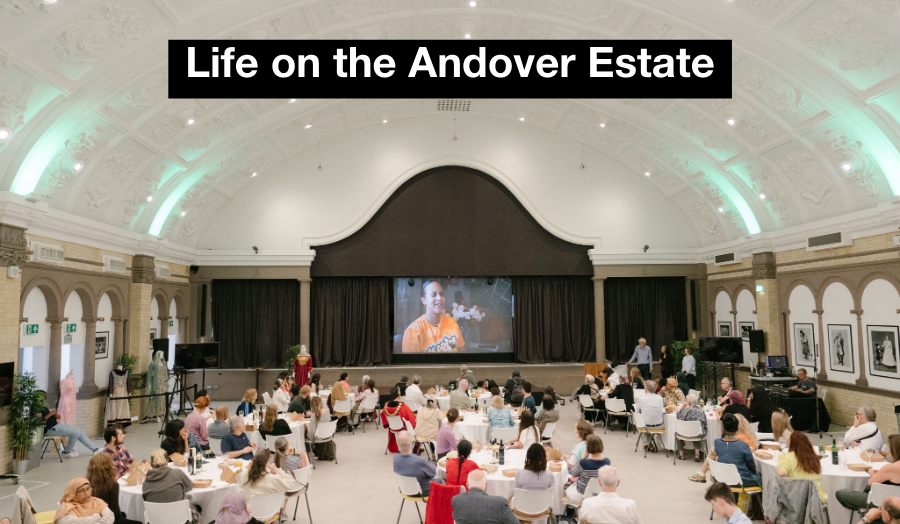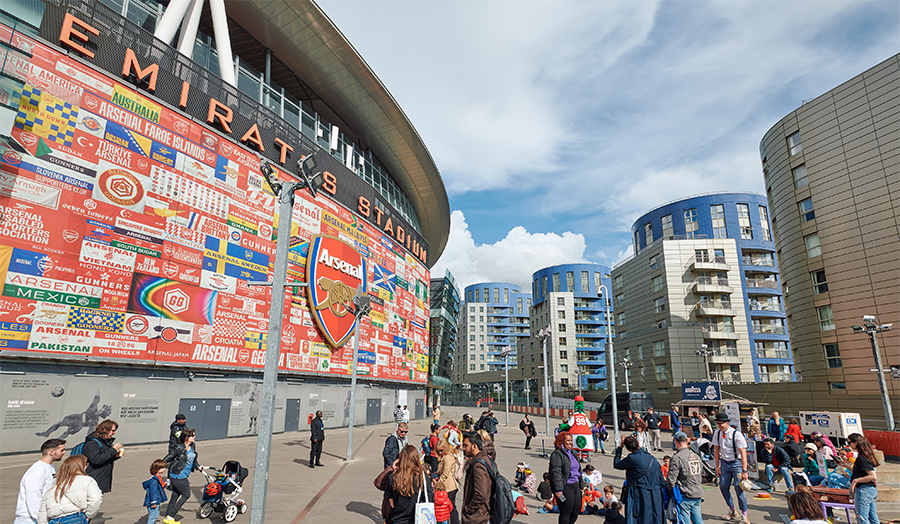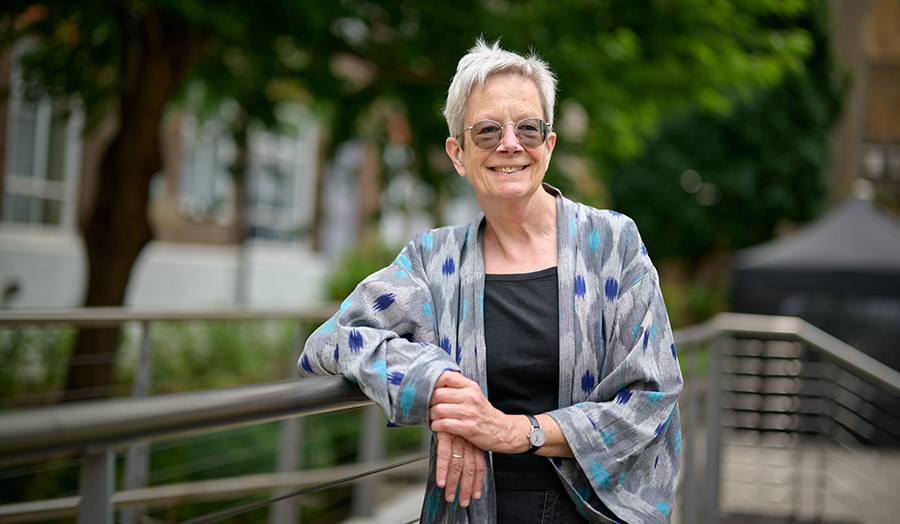Apply for this course
Please select when you would like to start:
If you're a UK/EU applicant applying for full-time study you must apply via UCAS unless otherwise specified.
UK/EU applicants for part-time study should apply direct to the University.
Non-EU applicants for full-time study may choose to apply via UCAS or apply direct to the University. Non-EU applicants looking to study part-time should apply direct to the University. If you require a Student visa, please be aware that you will not be able to study as a part-time student at undergraduate level.
Why study this course?
Are you interested in working with people and local communities? Do you see yourself as a future leader? Are you looking for a fulfilling career? If so, this could be the course for you.
Our Leadership in Communities BSc (Hons) degree focuses on social concerns affecting communities and individuals: housing and homelessness; the growth of food banks and movements for change such as Black Lives Matter. It also examines the principles of effective leadership and management, giving you the knowledge and skills to manage people, projects and organisations and to lead change in and with communities.
This course is also accredited by the Institute of Leadership and Management, meaning that you'll gain a widely recognised professional qualification in leadership and management in addition to a degree.
Our graduates enter a vast range of roles working with people in the public, private, voluntary and community sectors, and our unique and powerful selection of partnerships will give you a real step up when looking for jobs.
This course scored the following satisation rates according to the National Student Survey 2023. Academic support 100%, teaching and learning 97% and assessment 95%.
Boost your career prospects
Our graduates work in a range of roles in the public sector, such as councils and the NHS, and the private sector and the third sector, such as not-for-profit organisations including charities, voluntary and community groups
Accredited by two organisations
This course is also validated by two professional bodies, the Institute of Leadership and Management and the Chartered Institute of Housing
We're the first uni to be a member of WISH
London Met is the first university to be a corporate member of Women in Social Housing (WISH), a network of senior professionals to help you network and boost your career opportunities
Course modules
The modules listed below are for the academic year 2024/25 and represent the course modules at this time. Modules and module details (including, but not limited to, location and time) are subject to change over time.
Year* 1 modules
Year 2 modules
Year 3 modules
Cultures, Identity and Difference
This module currently runs:all year (September start) - Tuesday afternoon
(core, 30 credits)
This module examines the changing pattern of households and family life, work and employment, with a particular emphasis on differences in cultures and identities and how these interlink with social divisions. It addresses causes and patterns of inequality, and the opportunities and challenges of living in a super diverse society.
The module includes significant elements of study skills development, orientation to the university and the expectations of the university and course. The study skills element is embedded in the provision of the module.
The module is taught over 30 weeks and is assessed by workbooks and an essay.
Aims of the module
This module aims to:
1. Introduce students to university life and to the expectations of the course and academic life.
2. Identify changing patterns of households, family life, work and employment.
3. Explain differing patterns on inequality and the socio-political perspectives to issues of community, culture, multiculturalism, social exclusion and social cohesion.
4. Develop student skills in retrieving information, academic writing and presenting information to a range of audiences
Read full detailsIntroduction to communities
This module currently runs:all year (September start) - Thursday morning
(core, 30 credits)
Introduction to Communities engages students in the environment within which community work takes place, and to the policy context, particularly in relation to regeneration. This module is a building block for community work skills and knowledge. It introduces students to definitions of community work, its origins and development. The module explores the principles of community development work, drawing on the National Occupational Standards for Community Development. It aims to explore the concepts of Social Justice, Self Determination, Working and Learning together, Sustainable Communities, Participation and Reflective Practice. It is taught over 30 weeks and is assessed through an essay, reflective writing piece and an evaluative report.
This module aims to:
1. Introduce students to the principles of community work, drawing on national occupational standards;
2. Explain the history of community work and the current policy context;
3. Outline the opportunities and challenges of regenerating communities and areas;
4. Explain key concepts such as empowerment, participation, social justice and sustainability; and
5. Enable students to critically reflect on their own work practice.
Read full detailsSelf Leadership
This module currently runs:all year (September start) - Tuesday morning
(core, 30 credits)
This module introduces ideas concerning self-leadership through personal development planning (PDP) activities and peer supported learning. Students work on personal target setting, self-review and reflection to examine issues of concern to themselves and to various communities.
Self-leadership as a basic and pivotal component of leadership is introduced and various aspects of it are explored throughout the year. Specific attention is given to authentic leadership and equality, diversity and the development of inter-personal skills that support the learning process in group contexts. This includes opportunities for students to reflect upon the ways in which adults develop and work together for common aims. Students are encouraged to identify ways in which self-leadership strengthens community work and can promote individual learning and reflection.
Aims of the module:
1. To develop learners’ ability to engage in self-assessment exercises, Personal development planning and reflective techniques in relation to working with individuals and groups in the community;
2. To enable the learners to explore the links between self-leadership, leadership and community work;
3. To support the students to engage with communities;
4. To develop skills in finding and presenting information;
5. To enable learners to locate key sources for studying public service delivery and the opportunities for individuals and groups to influence decision making;
6. To enable learners to appreciate the diversity and changing nature of voluntary and community sector organisations.
Self Leadership
This module currently runs:all year (September start) - Tuesday morning
(core, 30 credits)
This module introduces ideas concerning self-leadership through personal development planning (PDP) activities and peer supported learning. Students work on personal target setting, self-review and reflection to examine issues of concern to themselves and to various communities.
Self-leadership as a basic and pivotal component of leadership is introduced and various aspects of it are explored throughout the year. Specific attention is given to authentic leadership and equality, diversity and the development of inter-personal skills that support the learning process in group contexts. This includes opportunities for students to reflect upon the ways in which adults develop and work together for common aims. Students are encouraged to identify ways in which self-leadership strengthens community work and can promote individual learning and reflection.
Aims of the module:
1. To develop learners’ ability to engage in self-assessment exercises, Personal development planning and reflective techniques in relation to working with individuals and groups in the community;
2. To enable the learners to explore the links between self-leadership, leadership and community work;
3. To support the students to engage with communities;
4. To develop skills in finding and presenting information;
5. To enable learners to locate key sources for studying public service delivery and the opportunities for individuals and groups to influence decision making;
6. To enable learners to appreciate the diversity and changing nature of voluntary and community sector organisations.
The anti-oppressive practitioner
This module currently runs:all year (September start) - Thursday afternoon
(core, 30 credits)
This module will embrace the notion of social justice, compassion, and inclusion. This is key to our Education for Social Justice Framework at London Metropolitan University
Rationale:
The rationale of this module is to provide students with an outline of the historical and contemporary approaches to the concepts of race, class, gender, sexuality, disability and other forms of oppressions and how power and the impact on notions of difference, identity, positionality and community has an affect. It will also explore how and when oppression became institutionalised and where it hasn’t been embedded in society supported by a unique philosophy.
It aims to:
● To explore and analyse the impact of the position that ideologies in relation to; race, class, gender, sexualities, age and disabilities etc. are socially and politically constructed with reference to difference, culture / distinction and community.
● Familiarise students with key issues that have practical importance in the lives of young people today, and assist students to reflect upon differences from a local to an international context and of the systems used by different societies to maintain people in a hierarchy.
● To analyse how power is maintained and implemented through normalising issues of compulsory heterosexuality, whiteness, religion and ‘ableism’. It will also explore, compare and contrast cultures where power has not been abused.
Development and Social Enterprise
This module currently runs:all year (September start) - Wednesday morning
(core, 30 credits)
This module invites students to consider the opportunities and challenges that social enterprise and entrepreneurship offer to communities and community development leaders and practitioners. Students will be required to participate in the planning, initiation and development of a real-world live project, culminating in the presentation of a project proposal. Lectures and workshops will introduce students to theories of project management, including financial planning, and teamworking and enable them to apply this in practice. Throughout the module there is a strong emphasis on reflective practice. Students will be required to critically review their proposal both in terms of internal consistency and external opportunities and challenges (reflection in action). They will also reflect on their contribution to effective teamworking in the development of the project and skills acquired on this module (reflection post-action).
The aims of this module are to:
- Critically understand the role of social enterprise, its strengths and limitations, in relation to community work.
- Identify key benefits and challenges of partnership and collaborative working
- Work with others to research and develop a viable proposal for a social enterprise, demonstrating potential social impact and financial sustainability
- Identify ways in which success / failure can be measured in the context of community action and ethical concerns
- Enhance their employability, particularly within the voluntary, community and social enterprise sectors.
- Reflect critically on issues of diversity, equality and social justice in relation to development and social enterprise.
Human Rights, Social Justice and Diversity
This module currently runs:all year (September start) - Monday morning
(core, 30 credits)
We are living through unprecedented and turbulent times characterised by neoliberal economic crises, growth of authoritarian political ideologies, impacts of climate change and the risks of uncertainties (e.g. Covid 19). They are all shaping our lives and experiences both individually and collectively. The quest for a framework of social justice and responses to these crises prompted heated political debates in the UK and beyond. Whereas on one hand the concept of social justice itself is arguably ‘hijacked’ by different political parties, resulting in the development of policies that further disadvantage those who are already marginalised in our society, momentum is growing - challenging those policies and communities are organising to change the tide.
It is in this context the module examines the core concerns of recent social policy initiatives. Over recent decades, persistent inequalities in British society led to the re-conceptualisation of these inequalities as ‘social exclusion’. In the context of Brexit, recent government rhetoric extols the virtue of voluntarism and “shared society” that respects the “bonds of family, community, citizenship and strong institutions” in their policies and practices whilst promising ‘levelling up’ to improve the living standard across the country. Most recently as the Covid-19 epidemic and the Black Lives Matter movement have exposed and amplified the inequalities in our society, there is a renewed focus on addressing the structural inequalities that are entrenched in the fabric of our society. A range of community-based projects lay at the heart of promoting ‘social inclusion’ and ‘social cohesion’. The core values of this approach are embodied in the National Occupational Standards for Community Development (CD NOS), the need for social justice and an understanding of our rich and diverse society. This module will offer the opportunity to evaluate emerging policy developments in these areas.
Aims of the module.
This module aims to:
- introduce students to competing ideas of social justice
- locate current debates about human rights and citizenship in their historical context
- examine inequality and diversity in the context of recent legislation and
- look at current approaches to social justice using the examples of the work place and community development work and
- link philosophical approaches with current policy and practice
Leadership and communities
This module currently runs:autumn semester - Monday afternoon
(core, 15 credits)
The module aims to:
- Introduce students to the key processes for the management of community and youth organisations.
- Provide opportunity for students to recognise professional and ethical aspects of leadership and management, and issues of equality, diversity and social justice in these fields
- Develop students' understanding and awareness of the issues of managing in community organisations by means of case-study analysis.
- Identify key benefits of partnership and collaborative working
- Encourage students to reflect on their capabilities as a manager and leader.
Researching Youth and Community Issues
This module currently runs:spring semester - Monday afternoon
(core, 15 credits)
This module will introduce research and specially applied research to students from Community Development and Leadership, Youth Studies, Youth Work and Youth Work Apprenticeship areas. Students will be introduced to the research process and research knowledge and skills relevant to professional and academic development. These research principles will provide a foundation for understanding approaches to social research, community profiling and evidence-based practice and research design. It will introduce research methods and the basics of preparing a research proposal on themes related directly to community and youth work. Reflective writing is a core component of this module. It will further focus on how to decide the appropriateness of different research approaches in a variety of environments.
Aims of the module
You will
- develop a strong foundation for understanding approaches to social and community research and evidence-based practice;
- develop research skills and knowledge for professional and academic purposes with a focus on community and youth work;
- develop a practical understanding of doing primary social research and understanding their underlying philosophies;
- explore the design and organisation of research approaches;
- critically analyse research reports encompassing different aspects of it;
- sharpen your reflective skills in the context of research.
Counselling in youth and community settings
(option, 15 credits)This module will embrace the notion of social justice, compassion, and inclusion. This is key to our Education for Social Justice Framework at London Metropolitan University
Rationale:
To introduce and familiarise students with key concepts of counselling in Youth and community settings and their implications in different professional contexts. This module requires students to explore and develop the basic skills needed for counselling and recognise the difference between listening to others as friends, parents, youth and community work practitioners or as counsellors. Due to the experiential nature of the course there is scope for personal development. Many of the exercises will focus on practising skills necessary for counselling and there will be theoretical inputs on the main influences in this area. The aim of the module is for students’ to be introduced to key concepts of counselling and provide a world perspective. The module will involve the students in active group learning, sharing some of their own experiences with other group members. The course will be very practical with the learning being conducted in the large group, small groups, triads and pairs. Emphasis will be placed on learning basic listening skills, finding out what counselling is, how it relates to the student in youth and community work settings, and recognising the importance of developing self-awareness.
In total there are three counselling modules, one at each level. It is envisaged that they correspond to the L1, L2 & L3 of the training structure that prospective counsellors have to undertake with regards to the hours and assessment strategies prior to attending the L4 Diploma in Counselling.
The successful completion of one module is the equivalent of L1.
The successful completion of two modules is the equivalent of L2.
The successful completion of three modules is the equivalent of the L3 qualification.
The module at L5 is an optional module for all the students in the University programmes and will be very much focused on developing counselling skills in working with young people in a variety of youth and community settings ranging from work in formal settings e.g schools, through to informal settings including detached work.
The modules at L5 & L6 will be optional modules. As such there will be an opportunity for all students to cover some of the basic skills in particular settings and working in groups respectively. For those with more experience it will enable them to develop their personal journey at a much deeper level and this will be reflected in the quality of their journal submissions, the depth of the essay question and the enhanced quality of their practical counselling intervention skills.
The assessment processes will be the same to reflect the methods of assessments used on the pre Diploma courses.
It aims to:
- Evaluate concepts of counselling in a world perspective and its role in youth and community work settings and analyse key approaches, core conditions and models of counselling.
- Develop an awareness of their own self-development and how they are able to use counselling skills to help develop others.
- Identify, examine and analyse diversity issues while working with people from different gender, race and sexualities and power dynamics and the importance of anti-oppressive practice.
Creative, critical reflective approaches to practice
This module currently runs:spring semester - Wednesday afternoon
(option, 15 credits)
This module will help you consider the ways that Social Workers, Youth and Community Workers can be creative in the use of ‘self’, reflection and in exploring imaginative new ways of working with people. You explore and learn about a range of creative approaches to enable the development of critical reflective dialogue and support individuals, groups and communities to analyse their circumstances and that issues affecting them, and to search for possible solutions that support growth and change.
Social Workers, Youth and Community Workers who work alongside marginalised individuals, families and communities are required to make difficult decisions and to intervene to support change and improve the circumstances of people’s lives. The social professions require professionals who have a high level of personal commitment, are open-minded and prepared to examine and even change their own attitudes and possible prejudices.
Each encounter with a vulnerable individual, family or community is unique and requires creative thinking about solutions that are specific to that individual, family or community. Ultimately a social professional’s creativity is motivated by and directed to understanding and improving the lives and conditions of marginalised people within society who are in need of support, advocacy and protection. Networking, supporting and championing new ways of meeting need are all creative endeavours, as is the ability to reflect both personally and with others.
Module aims:
- You will develop an understanding of concepts and underlying principles in fostering critical and reflective dialogue
- You will be able to use a range of creative approaches to support individuals, groups and communities to analyse their circumstances and explore potential solutions to issues affecting their lives.
- You will learn how to gather and use the feedback and insights of others to critically reflect on and further develop your own practice.
- You will develop a critical understanding of power and structural oppression and how this understanding can be used to challenge and disrupt inequality in practice
Disability and Inclusion
This module currently runs:autumn semester - Wednesday afternoon
(option, 15 credits)
The module aims to focus on the competing nature of the concept of “disability” and the implications it has on community development, social policies and practice. It examines disability as a new social movement that informs much of the social policy and welfare provisions and community practice today. The module considers the radical transformation of the ways in which disability is understood - informed by the Disability Rights Movements of the 70s and 80s in the UK, and enables students to engage in a culture of debates and reflection that are critical required for effective community work.
Module aims
The module aims to:
- Provide students with a foundation for understanding and analysing disability in the context of current welfare policies and practices.
- Enable students to grasp the principles of the social model of disability and its implications for social inclusion and community development.
- Provide students with an understanding of how the experience of disability is shaped by its interaction with gender, ethnicity and social class.
Resistance, Creativity and Joy in the Capital
This module currently runs:spring semester - Monday morning
(option, 15 credits)
This module will explore the relationship between London and the people of Africa and the Caribbean, unpacking the socio-economic and political factors that shaped the lives and subcultures often ‘hidden’ within London.
In doing so, it seeks to develop an understanding of the complexities in the lives of those in and around the capital from the African and Caribbean diaspora, whilst also embracing the joys of Blackness that are often undocumented and under narrated which include topics such as music, resistance, migration, and LGBTQIA+ lives.
Students will:
1. Explore how Black British history is woven into the cultural, economic, political and social life of the Capital City.
2. Examine how social, historical and political factors have shaped the experiences of African and Caribbean people in London.
3. Begin constructing their decolonial and critical thinking skills
4. Explore the contemporary cultural production, creativity, resistance, and joy in first, second and third generation African and Caribbean lives in and around London.
Read full detailsSustainability and Environmental Justice
This module currently runs:spring semester - Wednesday afternoon
autumn semester - Wednesday afternoon
(option, 15 credits)
In this module you will have a broad introduction to sustainability, while:
1. Investigating environmental threats including the climate crisis, pollution, and the global biodiversity crisis;
2. Exploring political, social, technological and economic solutions to these problems;
3. Considering systemic environmental inequality along the lines of social class, race/ethnicity, gender and Intergenerationally.
Read full detailsTransnational communities
This module currently runs:spring semester - Wednesday afternoon
(option, 15 credits)
The module enables the students to develop an understanding of global migration and economic, political structures and socio-cultural impact on diverse communities in Britain. It examines some of the rapidly changing migratory patterns and emergence of new refugee and migrant communities. The main focus of the module is an examination of transnational communities in the UK and their hybrid identity of belonging to at least to two nationalities, cultures, economies and politics (‘being here and there’). The module tackles topics of citizenship and diaspora and whether and how it is possible to develop a sense of belonging in a culturally diverse society. It enables the students to develop a critical understanding of the emerging cultures and communities in Britain and examine some of the changes which have taken place as a result of the global migration and technological innovation. This module will also enable the students to carry out secondary research on their chosen transnational community.
Module aims:
- To provide students with the opportunity to explore and critically analyse the current migratory changes in contemporary Britain.
- To familiarise students with debates on transnationalism, diasporic communities and citizenship
- To enable students to identify a transnational community and explore their range of transnational links and activities regarding their settlement and origin country in the context of challenges posed by societal change and diversity for integration, social cohesion and community development in contemporary Britain.
- To enable the learners to critically reflect on their learning and relate the wider socio-economic and cultural contexts to their everyday experience and community development work.
Community and youth dissertation
This module currently runs:all year (September start) - Thursday afternoon
(core, 45 credits)
This module develops students’ research skills further and involves the design, completion and write-up of a supervised, independent research project. This module expects students to carry out small-scale primary research as well as secondary research. It incorporates an on-going self -evaluation written up as a reflective research log and demands considerable time management abilities as well as the deployment of academic skills. In Parallel with the Placement module, the research can be carried out at the same organisation where the Work Placement is carried out. Students also have the choice of a completely different topic.
Aims of the module, you will
- develop, refine and apply research skills and critical capacities, building on the core research skills developed through the Intermediate level module Researching Community and Youth Issues;
- undertake independent research in an area of your choice;
- explore an issue affecting community or youth organisations or communities and carry out a small-scale project using primarily primary research as well as secondary research;
- explore complex issues which are of importance to communities and /or community organisations and offer your analysis of the findings;
Throughout the above process, you will receive structured supervision and support.
Read full detailsWork Placement for professional development
This module currently runs:all year (September start) - Thursday afternoon
(core, 45 credits)
This module is designed to help students to develop employability skills and through exposure to work experiences related to their discipline through either voluntary or paid work. Students may wish to explore setting up their own enterprise and start up projects. Key aspects of the modules will include gaining first-hand experience of work and the ability to develop and showcase skills to potential employers. The module will include employability skills such as interview skills, job applications and role plays
The aims of the module are to:
- Enable students undertake a work-based placement appropriate to their academic level
- Enable students develop the skills and competences for tackling real life problems in the workplace as they build on and apply current academic skills
- Provide students with the opportunity to reflect critically on their practice-based experience of the working environment
- Become aware of the culture and structure of a working environment and develop new skills.
- Enable students to understand the changing culture, nature and structure of organisations and evaluate implications for effective inter-professional working within a theoretical and practice-based framework.
Students will be contacted prior to the semester to provide support in securing work based activity in good time. Students are responsible for applying for opportunities and to engage with the Module and Work Based Learning teams to assist them. The suitability of any opportunities will be assessed by the Module Team/Work Based Learning Team and all roles must meet the Health and Safety requirements for Higher Education Work Placements. Those studying on a Student Visa will be required to submit weekly timesheets for the hours undertaken for the work-based learning activity to meet Visa requirements. These will need to be signed by their line manager/supervisor.
Read full detailsCommunity activism and digital campaigning
(option, 15 credits)The module aims to provide students with an understanding of:
- The relationship between community and youth activism
- The concept of citizenship in action
- Practical approaches to supporting lobbying, single issue and political campaigning including use of social media
The aim of the course is to develop a critical understanding of the role of activism in changing policy, meeting local needs and improving people’s lives.
Counselling in groups
This module currently runs:spring semester - Thursday morning
(option, 15 credits)
This module will embrace the notion of social justice, compassion, and inclusion. This is key to our Education for Social Justice Framework at London Metropolitan University
Rationale:
To introduce and familiarise students with key concepts of counselling in groups and their implications in different professional contexts. This module requires students to explore and develop the basic skills needed for counselling and group work and recognise the difference between listening to others as friends, parents, youth and community work practitioners or as counsellors. Due to the experiential nature of the course there is scope for personal development. Many of the exercises will focus on practising skills necessary for counselling in groups and there will be theoretical inputs on the main influences in this area. The aim of the module is for students’ to be introduced to key concepts of counselling and provide a world perspective on group work counselling. The module will involve the students in active group learning, sharing some of their own experiences with other group members. The course will be very practical with the learning being conducted in the large group, small groups, triads and pairs. Emphasis will be placed on learning basic listening skills, finding out what counselling is, how it relates to the student in youth and community work settings, and recognising the importance of developing self-awareness.
In total there are three counselling modules, one at each level. It is envisaged that they correspond to the L1, L2 & L3 of the training structure that prospective counsellors have to undertake with regards to the hours and assessment strategies prior to attending the L4 Diploma in Counselling.
The successful completion of one module is the equivalent of L1.
The successful completion of two modules is the equivalent of L2.
The successful completion of three modules is the equivalent of the L3 qualification.
The module at L6 is an optional module for all the students in the University programmes and will be very much focused on developing counselling skills in working with young people in a group setting in formal and informal groups.
The modules at L5 & L6 will be optional modules. As such there will be an opportunity for all students to cover some of the basic skills in particular settings and working in groups respectively. For those with more experience it will enable them to develop their personal journey at a much deeper level and this will be reflected in the quality of their journal submissions, the depth of the essay question and the enhanced quality of their practical counselling intervention skills.
The assessment processes will be the same to reflect the methods of assessments used on the pre Diploma courses.
It aims to:
- Critically examine what is counselling groups in a world perspective and its role in youth and community work settings and analyse key approaches, core conditions and models of counselling.
- Develop a critical awareness of their own self-development and how they are able to use counselling skills to help develop others within groups.
- Critically examine diversity issues while working with people from different gender, race and sexualities and power dynamics and the importance of anti-oppressive practice especially in group settings.
Diverse London
(option, 15 credits)This module celebrates the super-diversity of the capital city. Students will explore London’s diversity through their own lived experience, and the experience of their families and local communities. London is a ‘city without walls’, welcoming people from all backgrounds looking for a better future and to increased freedom to realise their hopes and ambitions. The module will place individual experience within the varied experiences of minoritized communities- for example in terms of ethnicity, faith and sexuality.
The aims of the module are to:
- celebrate the history of London in relation to diverse communities
- place the lived experience of diversity within the wider process of economic, cultural and socio-economic change
- identify the challenges faced by minoritized communities and celebrate their achievement
- develop research skills in relation to the diverse communities of London
Homelessness and Housing Policy
This module currently runs:autumn semester - Thursday morning
(option, 15 credits)
In this module, you will look at one of the most pressing social issues in the UK today – that of the cost and shortage of housing and of the shortage of affordable housing in particular. Living in a safe, comfortable and secure home is a human right, essential to our wellbeing. However, it is widely agreed that we have a housing crisis in the UK. This crisis is perhaps especially acute in London but it is a crisis which affects much of the country. Over the past ten years, the cost of housing, including rents in the private rented sector have spiralled while the number of social rented homes has continued to fall and the numbers of people who are homeless or living in temporary accommodation has risen. In this module, you will look at the scale and at the underlying causes of the housing crisis in the UK. You will look at the shortage of affordable housing, the growth of the private rented sector and at the collapse of social rented housing. You will also look at how access to housing and the housing market reflects wider social divisions in terms of class, ethnicity and gender. The module places housing and housing policy at the core of our understanding of society, social divisions and social policy.
The module focuses on housing policy and on social housing, looking at the history of social housing in the UK and at changes in housing policy since the 1980s. The module also looks at the growth of homelessness and at the underlying causes of the growing level of homelessness. You will look at homelessness policy, at good practice models of how to tackle homelessness and at the link between housing and poverty and the importance of both housing and welfare policy as instruments of poverty reduction.
The aims of the module are to:
- understand what the housing market is and how it works
- develop an understanding of the problems in accessing decent housing in the UK, how widespread the problems are, which groups suffer most and why these problems appear to have worsened over recent years
- develop data handling and data analysis skills to collect and analyse relevant data on housing and the housing crisis in the UK
- develop and demonstrate an understanding of housing policy and housing policy changes in the UK
- develop policy analysis and policy evaluation skills
- understand how the housing market reflects the different economic and political ideologies which shape housing policy
Housing Issues and Housing Solutions
This module currently runs:spring semester - Thursday morning
(option, 15 credits)
Housing Issues and Housing Solutions outlines the key issues that face people working in housing, residents and community workers. It will focus on a practical approach to dealing with community-related & housing issues, their causes and solutions. It will examine the rights and obligations of residents and identify good practice in key management areas such as resident involvement, dealing with anti-social behaviour and disrepair. Combined with other modules in the faculty, such as ‘Housing and Homelessness’, this module provides a housing pathway for students wishing to develop or further their careers in this area.
The module aims to:
- Place changes in housing management in the context of wider social, economic and organisational changes; (A01)
- Introduce the key practical issues facing housing professionals, and good practice in addressing these issues; (A02)
- Identify ways in which housing service users and community workers can challenge poor performance and get involved in service improvement; (A03)
- Examine the benefits and challenges of partnership working in dealing with housing issues; (A04)
- Explain current discussions on the balance of rights and responsibilities for social housing tenants and other local residents. (A05)
International relationship-based practice for social change
This module currently runs:autumn semester - Thursday morning
(option, 15 credits)
This module introduces a range of relationship-based approaches to social work practice that aim to affect societal change through working with the individual. These approaches share a common underlying philosophy of seeing people as inherently valuable and full of potential. Rather than taking a deficit-oriented view of the individual, they go beyond individual cases by attempting to understand the systemic factors that influence people’s lives. In this module you will develop an in-depth understanding of social pedagogy, critical pedagogy, radical social work, poverty aware social work, and Ubuntu philosophy. Their origins and implementation across different countries and over time will be explored, along with newer applications in Britain.
The approaches presented are contrary to the Anglo-American individual casework tradition that emphasises people’s deficits. Through engagement with key reading, discussion, and reflection you will develop an understanding of the social pedagogical concept of Haltung (inner attitude, ethos) as the foundation for meaningful, relationship-based practice. The concepts and tools taught in this module are a powerful antidote to managerialised, target driven practice, allowing practitioners to effectively use discretion to connect with service users and effect change even in practice settings governed by neoliberal policies.
You will practice a range of communication and engagement tools that can be used across practice settings to work with children, young people, adults, and groups. These include active and creative methods, and making use of, and sharing your interests and experiences.
This module provides opportunities for you to:
- Develop an in-depth and critical knowledge base on how relationship-based approaches can be used to effect social change and promote social justice.
- Gain a deeper understanding of your professional values and role and how these can be used for advocacy.
- Develop practical communication and engagement skills to apply this way of working in any setting.
- Explore how to use your skills, interests, and personality to make connections whilst respecting professional boundaries.
Management and Supervision in Youth and Community Work Settings
This module currently runs:all year (September start) - Tuesday afternoon
(option, 30 credits)
This module has been designed for students preparing to work in the voluntary and Statutory Sector in areas such as Youth and Community Work. The content and curriculum has been aligned to our Education for Social Justice Framework, and will examine and critically analyse the notion of power, equality and discrimination. Management and Supervision models, theories and interpersonal skills will enable you to critically think about your approach to management.
This module is designed to aid your professional development with a particular emphasis on the Youth/Community development sector. You will explore identified key skills underpinned by key theories, concepts and ideas, in order to be an effective practitioner thus increasing your employability in the sector. There will be opportunities for you to improve your current skill set and critically reflect in order to enhance development.
Managing innovative projects and /or established programmes and organisations is a highly skilled profession. In this module you will critically analyse the varying management styles as well as exploring the role of a leader. Equally important is to engage effectively with your staff team. Enabling them to succeed and to identify learning requirements to enhance their practice. Understanding supervision and the role it plays in supporting staff is key to a learning environment.
The module aims are to:
- Analyse how key sociological/psychological concepts and theories of youth and community work interact with employment skills
- Provide insight into theoretical learning while linking to previous or potential practical experiences.
- Incorporate experiential learning techniques to critically examine learning theory and promoting self-reflection to aid students’ understanding of knowledge and skills needed in employability.
- Gain an understanding of how partnership and collaborative working can improve youth work practice and the lives of young people, and provide examples of such collaborative partnership work;
- Introduce students to the sector’s professional occupational standards and theoretical frameworks for critical reflective practice
- develop students’ self-confidence as effective practitioners through the understanding of relevant theoretical knowledge and how they relate to the development of identified key skills such as project management, communication and presentation skills and supervision





.png)

















